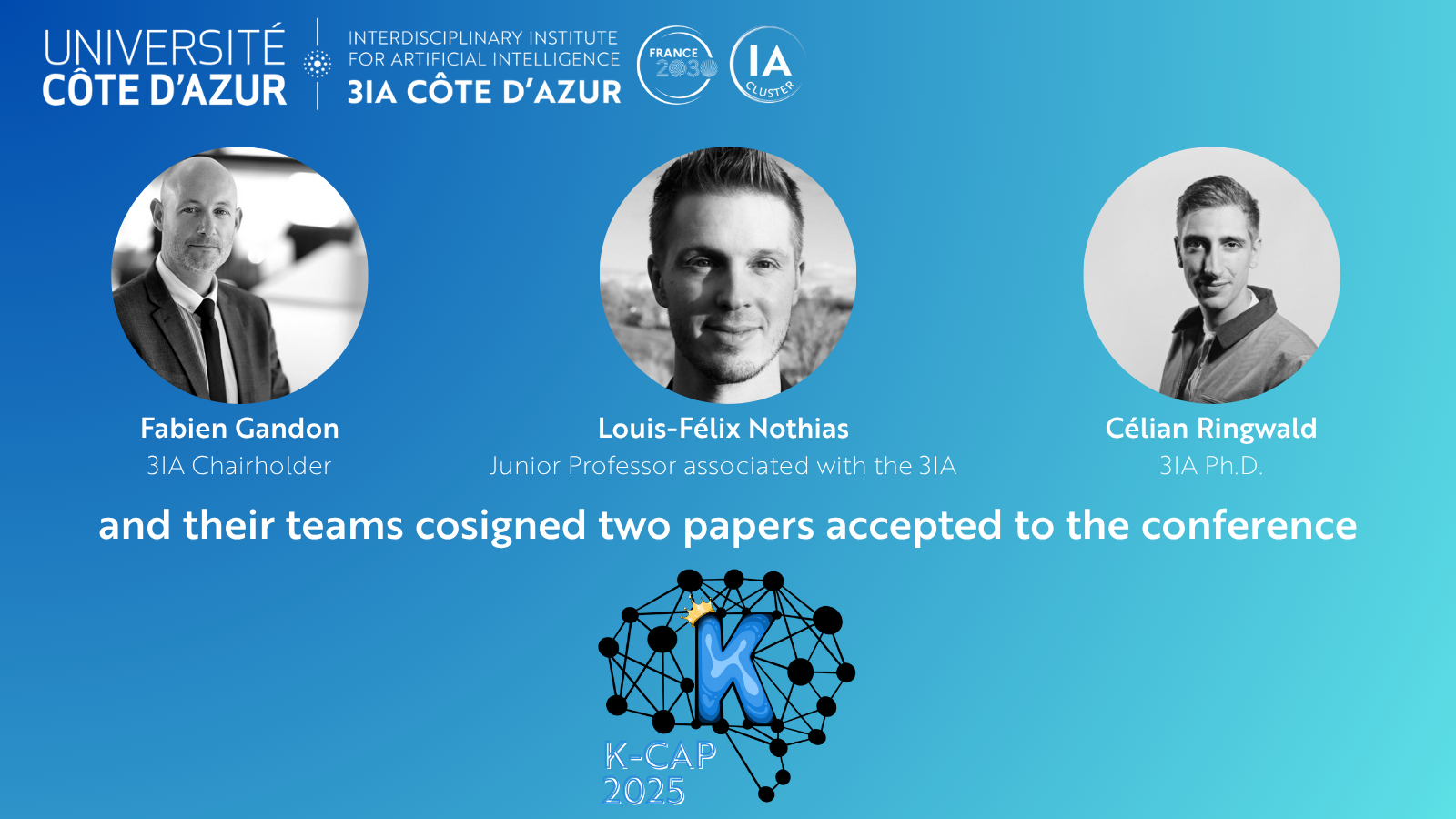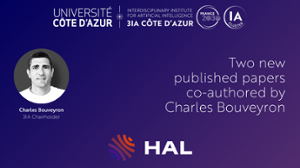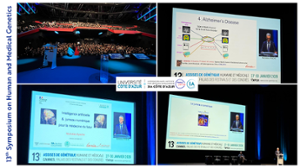Two papers cosigned by Fabien Gandon, Louis-Félix Nothias, Célian Ringwald, and their teams accepted at K-CAP 2025
- Research
Published on October 23, 2025
–
Updated on October 23, 2025
Dates
on the October 23, 2025
December 10-12, 2025
Location
Dayton, Ohio, USA

The 3IA Côte d'Azur team is delighted to announce that two articles cosigned by three 3IA researchers and their teams are accepted at the Thirteenth International Conference on Knowledge Capture.
➊ "Q2Forge: Minting Competency Questions and SPARQL Queries for Question-Answering Over Knowledge Graphs"
By Yousouf Taghzouti (Postdoctoral Researcher), Franck Michel (Research Engineer and Researcher), Tao Jiang (Researcher and Associate Professor), Louis-Félix Nothias (Junior Professor associated with the 3IA), Fabien Gandon (3IA Chairholder)
Abstract: The SPARQL query language is the standard method to access knowledge graphs (KGs). However, formulating SPARQL queries is a significant challenge for non-expert users, and remains time-consuming for the experienced ones. Best practices recommend to document KGs with competency questions and example queries to contextualise the knowledge they contain and illustrate their potential applications. In practice, however, this is either not the case or the examples are provided in limited numbers. Large Language Models (LLMs) are being used in conversational agents and are proving to be an attractive solution with a wide range of applications, from simple question-answering about common knowledge to generating code in a targeted programming language. However, training and testing these models to produce high quality SPARQL queries from natural language questions requires substantial datasets of question-query pairs. In this paper, we present Q Forge that addresses the challenge of generating new competency questions for a KG and corresponding SPARQL queries. It iteratively validates those queries with human feedback and LLM as a judge. Q Forge is open source, generic, extensible and modular, meaning that the different modules of the application (CQ generation, query generation and query refinement) can be used separately, as an integrated pipeline, or replaced by alternative services. The result is a complete pipeline from competency question formulation to query evaluation, supporting the creation of reference query sets for any target KG.
Learn more
➋ "Overcoming the Generalization Limits of SLM Finetuning for Shape-Based Extraction of Datatype and Object Properties"
Célian Ringwald (3IA Ph.D.), Fabien Gandon (3IA Chairholder), Catherine Faron (Full Professor), Franck Michel (Research Engineer and Researcher), Hanna Abi Akl (Professor and Researcher)
Asbtract: Small language models (SLMs) have shown promises for relation extraction (RE) when extracting RDF triples guided by SHACL shapes focused on common datatype properties. This paper investigates how SLMs handle both datatype and object properties for a complete RDF graph extraction. We show that the key bottleneck is related to long-tail distribution of rare properties. To solve this issue, we evaluate several strategies: stratified sampling, weighted loss, dataset scaling, and template-based synthetic data augmentation. We show that the best strategy to perform equally well over unbalanced target properties is to build a training set where the number of occurrences of each property exceeds a given threshold. To enable reproducibility, we publicly released our datasets, experimental results and code. Our findings offer practical guidance for training shape-aware SLMs and highlight promising directions for future work in semantic RE.
Learn more
By Yousouf Taghzouti (Postdoctoral Researcher), Franck Michel (Research Engineer and Researcher), Tao Jiang (Researcher and Associate Professor), Louis-Félix Nothias (Junior Professor associated with the 3IA), Fabien Gandon (3IA Chairholder)
Abstract: The SPARQL query language is the standard method to access knowledge graphs (KGs). However, formulating SPARQL queries is a significant challenge for non-expert users, and remains time-consuming for the experienced ones. Best practices recommend to document KGs with competency questions and example queries to contextualise the knowledge they contain and illustrate their potential applications. In practice, however, this is either not the case or the examples are provided in limited numbers. Large Language Models (LLMs) are being used in conversational agents and are proving to be an attractive solution with a wide range of applications, from simple question-answering about common knowledge to generating code in a targeted programming language. However, training and testing these models to produce high quality SPARQL queries from natural language questions requires substantial datasets of question-query pairs. In this paper, we present Q Forge that addresses the challenge of generating new competency questions for a KG and corresponding SPARQL queries. It iteratively validates those queries with human feedback and LLM as a judge. Q Forge is open source, generic, extensible and modular, meaning that the different modules of the application (CQ generation, query generation and query refinement) can be used separately, as an integrated pipeline, or replaced by alternative services. The result is a complete pipeline from competency question formulation to query evaluation, supporting the creation of reference query sets for any target KG.
Learn more
➋ "Overcoming the Generalization Limits of SLM Finetuning for Shape-Based Extraction of Datatype and Object Properties"
Célian Ringwald (3IA Ph.D.), Fabien Gandon (3IA Chairholder), Catherine Faron (Full Professor), Franck Michel (Research Engineer and Researcher), Hanna Abi Akl (Professor and Researcher)
Asbtract: Small language models (SLMs) have shown promises for relation extraction (RE) when extracting RDF triples guided by SHACL shapes focused on common datatype properties. This paper investigates how SLMs handle both datatype and object properties for a complete RDF graph extraction. We show that the key bottleneck is related to long-tail distribution of rare properties. To solve this issue, we evaluate several strategies: stratified sampling, weighted loss, dataset scaling, and template-based synthetic data augmentation. We show that the best strategy to perform equally well over unbalanced target properties is to build a training set where the number of occurrences of each property exceeds a given threshold. To enable reproducibility, we publicly released our datasets, experimental results and code. Our findings offer practical guidance for training shape-aware SLMs and highlight promising directions for future work in semantic RE.
Learn more


